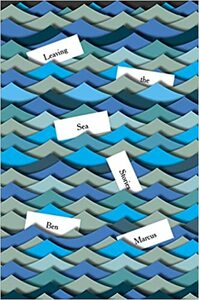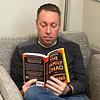Take a photo of a barcode or cover
As a disclaimer, I generally dislike short stories, but I keep trying. The writing in this book was alright, perhaps even well done. But the first few were just about pathetic losers, and then the stories started becoming more abstract. Just didn't really interest me at all.
medium-paced
Plot or Character Driven:
A mix
Strong character development:
N/A
Loveable characters:
N/A
All the alienation & bleakness of white men in The New Yorker cartoons without the witty cosmopolitan charm or piercing emotional insight.
Doesn't start off too promisingly, the first 4 stories lacking Marcus' linguistic pyrotechnics and displaying rather conventional narratives involving people in difficult family relationships. The second story is even about a writer giving a creative writing course which I always find self-indulgent an d full of in-trade references. But then the book absolutely takes off & soars as you see Marcus display what I call linguistic dystopias as he creates scenarios where language has broken down and been misplaced one after the other and reveals that he is able to do in short story form what his longer novels do. "First Love" is simply the best, as it looks at the strange ritual of seduction & sex through very alien eyes, as if to say all the signs & symbols we use in such a dance, are baffling and leave us a world apart from communicating with our partners. The other story I really enjoyed was "The Loyalty Protocol" which saw some rehearsals for evacuation in the face of an unspecified apocalyptic threat that laid bare the utter futility of the bureaucratic thinking that dreams up such plans. It echoed parts of Marcus' novel "The Flame Alphabet" but still struck new ground. No one else writing today that I know of amputates and then resutures language into the wrong places as Marcus does. So we have "languageflower" in "First Love" and fabrics replacing language in "The Father Costume" where fabric both mutes sound and possesses its own encoding of messages and communication.
This book fell between "did not like it" and "it was okay", as the individual stories could go either way. There were maybe 3 of the 15 stories that I somewhat liked but the rest were too confusing and/or too sexual. I also noted, in at least 4-5 stories, that the author kept using the word 'rape' in mostly unnecessary ways. I found it too jarring and I was also put off by the constant fat shaming throughout the book. Three to four of Marcus' stories had main characters that were fat or overweight and in each story he kept harping on that characteristic and how that character was grotesque and undesirable.
Overall, I felt that I was just in the misogynistic and sleazy mind of an egotistical man.
Overall, I felt that I was just in the misogynistic and sleazy mind of an egotistical man.
I liked these stories, though I knew a couple of them went over my head because of Ben Marcus' amazing but challenging writing. I really enjoyed The Moors, which took place in the span of about two minutes. And Rollingwood, about a divorced father of a sick infant whose ex-wife disappears. I do feel that some were a bit forgettable, though.
The first section surprised and bummed me out - and not in the way I want to be surprised and bummed out by Ben Marcus - but after that things got better. Definitely an uneven collection, but there are some great pieces in here. Marcus is possessed of an absolutely unique voice and perspective, of that there is no doubt, I just hope he's not moving into writing exclusively about men worn down to bitter nubs by women/babies/families.
This collection ranged from straighforward-and-awesome stories, to experimental-and-awesome stories, to experimental-and-WTF-is-he-talking-about stories. The stories in the former two categories were mostly really interesting and fun to read. The stories in the latter (of which, mercifully, there are fewer) were a bit of a slog — you have almost no clue what is going on, like Marcus forgot to include the Rosetta stone that would translate his words into a recognizable story. But so, the collection is arranged in six section, the first of which includes four pretty straight-forward stories, all of which are really good. "I Can Say Many Nice Things" is a highlight — an amusing, slightly sad story about a guy teaching a writing workshop on a cruise ship. The last story in the collection, the longest - almost novella length - was a mixed bag, a microcosm of the collection itself. It's titled "The Moors," and it's ostensibly about a creeping guy following a woman to the office coffee bar. But throughout the story, Marcus is digressive and philosophical and sometimes hilarious and sometimes unintelligible. I'd recommend reading this story first, actually, and then starting at the beginning with the more traditional short stories. (Oh, and I'd recommend skipping "The Father Costume" all together - it doesn't make a lick of sense.)
Not to be a hater or anything but I think I hated that book … and I read the whole thing (it was very hard to do)





